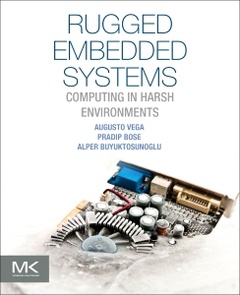Description
Rugged Embedded Systems
Computing in Harsh Environments
Authors: Vega Augusto, Bose Pradip, Buyuktosunoglu Alper
Language: English
Subjects for Rugged Embedded Systems:
96.04 €
In Print (Delivery period: 14 days).
Add to cartSupport: Print on demand
Description
/li>Contents
/li>Readership
/li>Biography
/li>Comment
/li>
Rugged Embedded Systems: Computing in Harsh Environments describes how to design reliable embedded systems for harsh environments, including architectural approaches, cross-stack hardware/software techniques, and emerging challenges and opportunities.
A "harsh environment" presents inherent characteristics, such as extreme temperature and radiation levels, very low power and energy budgets, strict fault tolerance and security constraints, etc. that challenge the computer system in its design and operation. To guarantee proper execution (correct, safe, and low-power) in such scenarios, this contributed work discusses multiple layers that involve firmware, operating systems, and applications, as well as power management units and communication interfaces. This book also incorporates use cases in the domains of unmanned vehicles (advanced cars and micro aerial robots) and space exploration as examples of computing designs for harsh environments.
1. Introduction2. Reliable and power-aware architectures: Fundamentals and modeling3. Real-time considerations for rugged embedded systems4. Emerging resilience techniques for embedded devices5. Resilience for extreme scale computing6. Security in embedded systems7. Embedded security8. Reliable electrical systems for micro aerial vehicles and insect-scale robots: Challenges and progress9. Rugged autonomous vehicles10. Harsh computing in the space domain11. Resilience in next-generation embedded systems
Computer engineers and computer scientists in electrical engineering and telecommunications; researchers and graduate students
Pradip Bose is a Research Staff Member and Manager of the Reliability- and Power-Aware Microarchitectures Department at IBM T. J. Watson Research Center. His research interests are in the area of processor and system architectures, with a focus on technology-aware design. Pradip is also an Adjunct Professor in the Department of Computer Science at Columbia University. During 1983-1987, Pradip was a member of IBM’s pioneering RISC superscalar processor R&D team. During the 1989-90 academic year, Pradip was on sabbatical leave from IBM, serving as Visiting Associate Professor at Indian Statistical Institute (ISI) in Calcutta, India. At ISI, Pradip served as the coordinating leader of an UNDP-sponsored project on knowledge- based computer systems.
Alper Buyuktosunoglu is a Research Staff Member in Reliability and Power-Aware Microarchitecture department at IBM T. J. Watson Research Center. He has been involved in research and development work in support of IBM p-series and z-series systems in the area of power-aware computer architectures. His research interests are in the area of high performance, power/reliability-aware computer architectures. He has over 60 pending/issued patents, has published over 60 papers, and is currently serving on the editorial board of IEEE MICRO.
- Provides a deep understanding of embedded systems for harsh environments by experts involved in state-of-the-art autonomous vehicle-related projects
- Covers the most important challenges (fault tolerance, power efficiency, and cost effectiveness) faced when developing rugged embedded systems
- Includes case studies exploring embedded computing for autonomous vehicle systems (advanced cars and micro aerial robots) and space exploration




